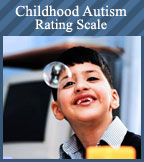The purpose of the Childhood Autism Rating Scale (CARS) is to identify & classify children with autism, and to distinguish them from developmentally handicapped children without the autism syndrome. Administered individually to a child aged 2 years old older, is a behavior rating scale developed to identify children with autism, to discriminate between children with autism and other developmental disorders, and to assess the severity of autistic disorder in children within a range of mild to severe. The 15-item rating scale has been in development since 1971 and in its original form was referred to as the Childhood Psychosis Rating Scale. The authors have gone to great length to include diagnostic criteria from multiple classification systems and various theoretical perspectives of autism in the development of this instrument.
Administered over 15-20 minutes, the Childhood Autism Rating Scale (CARS) was developed in order to fill the need for an observational instrument that could reliably distinguish children with the autistic syndrome from children with other developmental disorders, as well as differentiate among levels of severity within the autistic syndrome. It can be used during observations of child behavior in a variety of settings, or may be used with information gleaned from chart or record reviews.
Our on-line course will assist you and help ‘fast-track’ your learning curve, so that you will more easily learn about this valuable instrument and how best to apply it to the children under your care. Similar to a Monarch or Cliff notes-type review, our online course provides the essential information in a condensed and more easily digestible format. Prior to ordering this course, be sure to have a complete copy of the CARS, with all testing materials.
Course intent: To provide early intervention therapists working with children who have autism with a focused understanding of the CARS assessment instrument that both fast-tracks their ability to process and assimilate their understanding of this imperative tool that helps differentiate children with disabilities from those with autism.
Relevance to early intervention: Psychologists as well as special educators and social workers may benefit from this primer as they are often on the front line of treating children with suspected autism. The CARS is an invaluable instrument critical to any initial evaluation of a child with suspected autism, and serves as a baseline for improvement in all other subsequent evaluations to document progress. Applicable in the visiting the home in the early intervention setting, facility based setting, or pre-school settings, this short and helpful course will assist the early intervention provider to navigate through the maze of material offered with the classical edition of the course.
Outcomes:
Provider will be able to: identify indices that differentiate between children with developmental disabilities and children with autism whether in the early intervention or preschool setting.
Provider will be able to: Identify indices that assess the severity of autism so as to determine short and long term goals for both individual family service plans (IFSP’s) in the early intervention setting, and individual educational plans within the pre-school setting
Provider will be able to: Identify all components of this behavioral rating scale
Provider will be able to: Identify use of instrument in variety of settings or how to extrapolate data from child record to augment testing of the child.
Provider will be able to: Utilize this assessment instrument to identify indices that can assist in recommended academic placement, instructional planning, and both initial and ongoing eligibility




